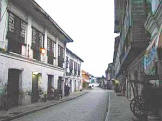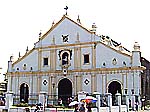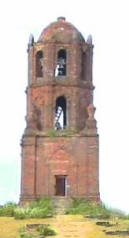
Location: Enchanted Kingdom, Laguna, Philippines
Date: March 15, 2009
...This helps me preserve my memories and share my life through photographs...
 Old Vigan Colonial Houses – the ancestral houses were built mostly by rich Chinese traders. These great big houses are made of thick brick walls and plastering with red clay. Tile roofs are made to survive earthquakes. The Mestizo district where more than a hundred houses line side by side along Calle Crisologo.
Old Vigan Colonial Houses – the ancestral houses were built mostly by rich Chinese traders. These great big houses are made of thick brick walls and plastering with red clay. Tile roofs are made to survive earthquakes. The Mestizo district where more than a hundred houses line side by side along Calle Crisologo.
St. Paul’s Cathedral - built in 1790-1800 by the Augustinians, this impressive Baroque  cathedral has most of its interior walls well preserved. The 12 altars and 3 naives only enhances the church beauty and grandeur. The bell tower is octagonal and is located 10 meters south of the cathedral. It is a place not to be missed when visiting Vigan.
cathedral has most of its interior walls well preserved. The 12 altars and 3 naives only enhances the church beauty and grandeur. The bell tower is octagonal and is located 10 meters south of the cathedral. It is a place not to be missed when visiting Vigan.
Palacio de Arzobispado – built in 1783, it is the official residence of the Archbishop of Nueva Segovia. The palace was the headquarters of Gen. Emilio Aguinaldo. Included in the palace is the Museo Nueva Segovia with a collection of paintings, manuscripts and religious articles accumulated through the centuries.
Burgos National Museum. - the museum building is the ancestral house of Padre Jose Burgos. One of the museum’s best feature are the paintings of Esteban Villanueva depicting the 1807 Basi  Revolt. The dioramas of local historical events is worth the visit. Included in the collections are antiques, manuscripts and other priceless items. There is a Tourist Information Center in Vigan to help visitors. And if you want to take a break, there are beaches to go to just a few minutes away from the town.
Revolt. The dioramas of local historical events is worth the visit. Included in the collections are antiques, manuscripts and other priceless items. There is a Tourist Information Center in Vigan to help visitors. And if you want to take a break, there are beaches to go to just a few minutes away from the town.
A good time to visit Vigan is during the town fiesta. Celebrated for one whole week -concluding on January 25 to commemorate the conversion of the apostle, St. Paul. The fiesta is marked by street parades, beauty contest and variety shows on the town plaza.
During the Holy Week, local and foreign tourist come to Vigan to see the religious processions of the antique and life sized statues mounted on elaborately designed carrozas that are paraded on the streets of Vigan.